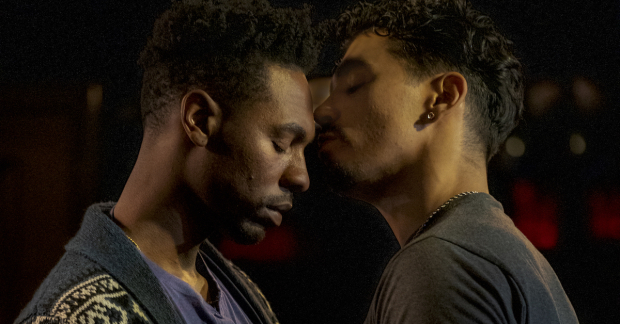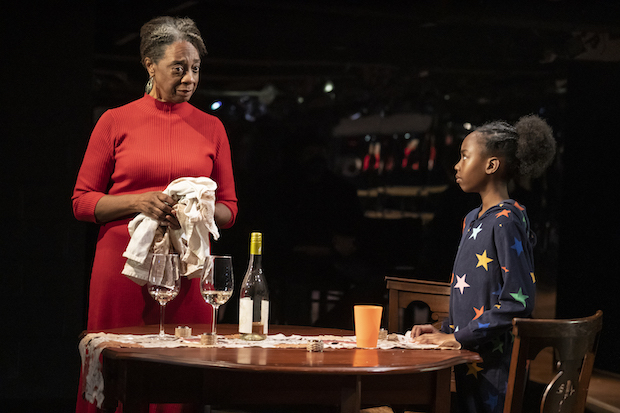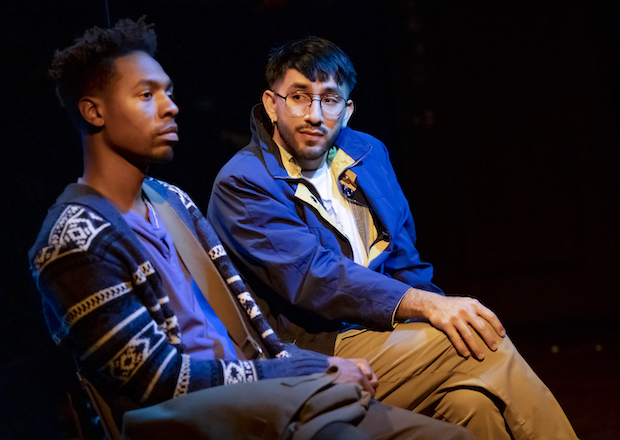Review: Finding a Way Back From Domestic Trauma in The Bandaged Place

(© Joan Marcus)
The Bandaged Place is, broadly speaking, about one person's attempts to move on from an abusive relationship. That's hardly a fresh topic for a work of art to explore. But sometimes a work of art can be striking less for the subject it tackles than how it goes about doing it. By that measure, Harrison David Rivers's new play, making its world premiere through Roundabout Theatre Company's Roundabout Underground initiative, is striking indeed.
The person in this case is Jonah (Jhardon DiShon Milton), a dancer who is currently recuperating from injuries that are keeping him from his artistic passion. The injuries, however, are more than just physical. Jonah has just gotten out of a relationship with Ruben (Anthony Lee Medina). Things appear to have ended badly enough that Jonah had to file a restraining order, and Ruben is already violating it by calling him. Over the course of the play, Rivers gradually reveals the chain of events that led to this fissure, which include not only Ruben's own abuse, but also the still-lingering emotional scars from Jonah being abandoned by his own parents as a baby.
Most of the play focuses on Jonah's troubled present — or rather, as specified in the program, his situation in November 2006, "pre-iPhone." Jonah's lingering trauma, for instance, leads to late or missed appointments to pick up his daughter, Ella (Phoenix Noelle at the performance I attended; she alternates with Sasha Manuel), from dance classes at Alvin Ailey Studios, despite the efforts of his devoted grandmother, Geraldine (Stephanie Berry), to keep him on track. The possibility of a way forward arrives in Ella's dance teacher, Sam (Jake Ryan Lozano), with whom he tentatively begins a relationship. But neither Ruben nor Jonah appears willing to put their past with each other behind just yet.

(© Joan Marcus)
The play's title (poetically styled all in lowercase in promotional material) derives from the 13th-century Persian poet Rumi: "Don't turn away. / Keep looking at the bandaged place. / That's where the light enters you." To some degree, Rivers's play is about a character who is trying to avoid confronting his trauma, an evasion that inevitably bleeds into his relationships. But there is also a spiritual element in the title that manifests itself not only in occasional prayers we see Geraldine offer up, but in Jonah's own name — a biblical reference to a prophet who was swallowed by a whale after initially disobeying God's orders to preach repentance. Only after he prays for forgiveness does the whale spit him out. This, according to Geraldine, is an illustration of God's own desire to give people second chances.
Such a focus on personal and spiritual struggle distinguishes The Bandaged Place from, say, any number of Lifetime TV movies about characters moving on from abusive relationships. Another is the visual and aural imagination that director David Mendizábal has brought to this production. Dance is certainly a part of it, most notably in a startling pas de deux dream ballet, choreographed by Tislarm Bouie, that functions as Jonah's attempt to try to put his relationship with Ruben to rest. But set designer Wilson Chin frames these events in a half-bedroom, half-dance-rehearsal-room space — with mirrors lining three walls of the Harold and Miriam Steinberg Black Box Theatre — that feels simultaneously naturalistic and surreal. Adding to the faintly surreal effect is Nic Vincent's brooding lighting design and Mauricio Escamilla's darkly ambient sound design, both of which vividly suggest Jonah's own shell-shocked headspace.

(© Joan Marcus)
Ultimately, it's the performers who carry the day. Lozano's exuberant extroversion as Sam offers a striking contrast to Milton's moroseness as Jonah, with Medina terrifying at times as the volatile Ruben. (One thing unites all three actors: their physical grace during dance sequences.) Amid the psychological and emotional fireworks, Berry exudes no-nonsense firmness and gravity as Geraldine. As young Ella, Noelle remarkably suggests precocity without overt cuteness.
The variety of personalities reflects Rivers's desire to encompass a wide range of emotions and humanity in his play. As tough as its subject matter is, The Bandaged Place is hardly a wallow in misery. Instead, it's an emotional roller coaster, in which unbridled joy can turn on a dime to disheartening pain — just like life itself. But the possibility of a way out, whether through artistic creation or through the more difficult prospect of facing trauma head-on, always remains for those willing to look for it in the first place. Rivers may not be telling a breathtakingly new story, but he has found inventive, heartfelt, and affecting ways to refresh a familiar one.











